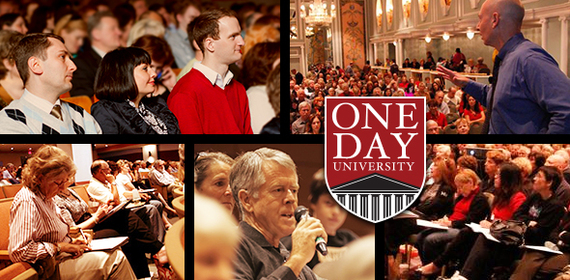You cannot make decisions about the future, without an understanding of the past. Our country is now stuck in the present moment, with no understanding of the past and no vision for the future.
So began the first powerful lecture that Life in the Boomer Lane attended, yesterday, at One Day University in Washington, DC. One Day U is the brainchild of Steven Schragis, who invites the most popular university professors around the country to give lectures covering a wide variety of topics. It's perfect: fascinating classes, minus homework and exams. Since 2006, One Day U has gone from one location to 55. Hundreds of professors across the country take part.
LBL just heard about One Day U a couple of years ago, and this was her 4th One Day U. Each one has been an intellectual awakening. Yesterdays line up was:
Five Turning Points that Changed American History, Jerimi Suri, University of Texas at Austin
Suri is mesmerizing. He covered 1. the presidency of George Washington, 2. the Civil War, 3. American Progressive reforms of domestic and foreign policy the early 20th century, 4.the Great Depression/ WW II/ the early Cold War, and 5. 9/11 and the subsequent War on Terror. All were powerful turning points in American history.
For Suri, no events occur in a vacuum. A knowledge of history is essential, not only to understand the present, but to form a vision of the future. As he took us through the five turning points, it was clear how each of these set the stage for what was to follow.
For example, the Civil War wasn't about slavery. It was, instead, a war over three economic systems that were not able to function together. The South: labor-surplice economy, in which people were the currency. The North: an industrializing economy, in which money was the currency. The West:a natural resources economy, in which land was the currency. And the victory of North over South (i.e. the victory of industrialization over labor-surplice) put in motion all of the events that occurred for decades after.
We are now in a reactive, fear-driven time in our history. Suri was asked what will have to take place, in order to change the fear-driven course we are on now. The answer was 1. the millennials-a new generation, with a new perspective 2. creative leaders 3. getting money out of politics.
The very best instructors are those who make things make sense. They also ignite our own thought processes, in addition to conveying the information that they have. Suri did exactly that.
Five Musical Masterworks that Changed America, Anna Celenza, Professor of Music and Head of the Music Department at Georgetown University.
Music does not simply reflect culture. It changes it. The five musical masterpieces that Celenza analyzed had a profound impact on our country. And the history of each of these pieces was fascinating.
Francis Scott Key wrote the Star Spangled Banner, not as a national anthem, but in homage to the defense of Ft McHenry in the War of 1812.. The song was a "parody," meaning it used the tune of another song and superimposed new lyrics. Parodies were very popular at the time. In this case, Kay used the tune of an old drinking song, from a men's club in London. It wasn't until 1931 that the song became the official national anthem of the US.
Other songs were instrumental in fueling the need for nature conservation, as well as the civil rights movement. Paul Simon, in his 1986 album Graceland, broke the barrier for African music and had a real impact on American foreign policy.
The presentation was accompanied by videos or soundtracks of the songs being performed. Not only did the music come alive, it came alive in a new and powerful way when accompanied by the back story and the subsequent influence it would have on the country.
Eight Books that Changed America, Joseph Luzzi, Literature and Italian Professor at Bard College
Luzzi is a true Renaissance man. In addition to teaching Italian and Literature, he is also a prolific writer and has an amazing grasp of history, culture, and politics. The breadth of his knowledge is mind-boggling. Added to that is his sense of humor. Luzzi is the eldest child of a working class immigrant Italian family, who placed little value on reading ("Get your nose outta dat book! You'll ruin your eyes! Whatsa matter wit dih TV? We paid good money for it!")
Luzzi reviewed eight books that had a profound impact on US culture: the Bible, Homer's Odyssey, Dante's Divine Comedy, Shakespeare's Hamlet, Virginia Woolf's To the Lighthouse, Ralph Ellison's Invisible Man, Harper Lee's To Kill A Mockingbird, and Joseph Heller's Catch 22.
It doesn't take much to get LBL's attention, when books are being discussed. Luzzi took LBL's interest to a new level.
LBL once again strongly encourages you to sign up for a One Day U near you. Just visit One Day U for schedules of all 55 cities. LBL promises you a fascinating, enlightening, and fun day. And for those of you in the DC area, as well as other areas around the country, One Day U will be holding a special one day event, "Rethinking America," that proves to be fascinating.
Please take one of these classes, and let LBL know what you think. She gets no money for these endorsements, so your feedback will make her life worth living.

